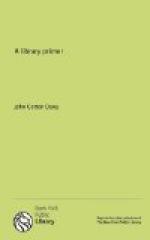Books for young people must be interesting. No amount of excellence in other directions will compensate for dull books.
Do not trust too much to the second-hand dealer. Avoid subscription books. Do not buy of a book peddler; in nine cases out of ten you can find better and cheaper books at the stores. A well selected and judiciously purchased library, with such works of reference as are needed, will cost, on an average, $1.25 a volume.
The following notes were prepared by a bookseller of experience, and should be carefully considered before beginning to buy books:
Any bookseller worthy your patronage will be able to assist you by pointing out the most desirable edition for general library use.
There is every reason for placing your orders with your local dealer so long as he can care for them intelligently. A large discount should not be the sole factor in deciding where to buy, but keep in mind this, a conscientious bookseller can save you money by carefully watching your interests in the very many details that pertain to bookbuying. Having decided on your bookseller agent, place all your orders with him. It will save you time, which is equivalent to money. Keep an exact duplicate copy of every order you place, and for this purpose a manifold book is preferable. In writing your orders never write on both sides of a sheet; arrange your items alphabetically by author, and make all your entries as complete and full as possible. This is particularly important in the case of books in the field of science, history, and biography. The more clear and definite your orders are made out, the more promptly and completely can your bookseller supply them.
An ideal bookseller, qualified to act as your agent, is one who has familiarized himself with the various editions of books, and will always make selections with greater stress on quality than quantity; who will not send you the second edition of a scientific work when a third is out; who will avoid sending you expensive publications (even though you may have ordered them) until he is satisfied that you want them; who will exert himself to get desirable books that may be out of print or issued by an out-of-the-way publisher; who will always be prepared to advise you as to the latest work on any particular subject, as well as the best work.




